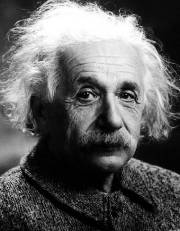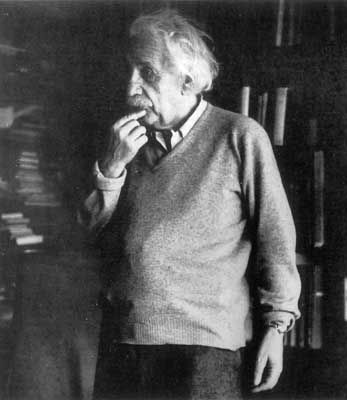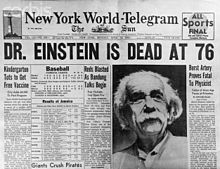Einstein in His Own Words
 Thoughts from Albert Einstein: His collection of essays, Out of My Later Years, published in 1950, presents Einstein's statement that, "science can only ascertain what is, but not what should be," necessarily excluding from its domain "value judgments of all kinds." Thus science could not even prove that the Holocaust or the slave trade were wrong. This raises questions about the approach of some pro-life groups that say: "We don't talk about God because we're going to win this based on the laws of science." But none of the laws of science even use the terms right and wrong. Abortion is wrong because it's a baby, and it's always wrong to intentionally kill a baby, and that's because children are made in God's image and God said, "Do not kill the innocent." (And just as science cannot determine right from wrong, neither can mathematics. This inability exposes the fundamental error in utilitarianism. "The greatest good for the greatest number of people," amounts to moral relativism which has widely infected the pro-life movement.)
Thoughts from Albert Einstein: His collection of essays, Out of My Later Years, published in 1950, presents Einstein's statement that, "science can only ascertain what is, but not what should be," necessarily excluding from its domain "value judgments of all kinds." Thus science could not even prove that the Holocaust or the slave trade were wrong. This raises questions about the approach of some pro-life groups that say: "We don't talk about God because we're going to win this based on the laws of science." But none of the laws of science even use the terms right and wrong. Abortion is wrong because it's a baby, and it's always wrong to intentionally kill a baby, and that's because children are made in God's image and God said, "Do not kill the innocent." (And just as science cannot determine right from wrong, neither can mathematics. This inability exposes the fundamental error in utilitarianism. "The greatest good for the greatest number of people," amounts to moral relativism which has widely infected the pro-life movement.)
Realizing that science does not address moral laws, Einstein wondered even about physical laws and why it should be that mathematical ideas, which are non-physical, should correspond so well to the physical universe. In 1921 Einstein asked, "How can it be that mathematics, being after all a product of human thought which is independent of experience, is so admirably appropriate to the objects of reality?" Even though he was uncomfortable with this concept, fifteen years later he was still wrestling with the same unshakable observation. For in 1936 Einstein famously wrote that, "the eternal mystery of the world is its comprehensibility." Then in 1944, remarking about atheist Bertrand Russell, he described the ability to get from matter to ideas as a "gulf–logically unbridgeable," which some scientists and linguists refer to as Einstein's Gulf. For while matter can be arranged to represent data, information itself is not material.
Why Could Einstein Not Comprehend? The universe is the product of the mind of God. And God created man in His image. This is why human thought can do such a great job describing reality. Einstein could not understand this because he described himself as an agnostic and claimed to believe only in "Spinoza's God," by which he seemed to mean the laws of nature. Beyond Einstein's grasp then was the reason why mathematical thought could describe the physical world. For the mathematically beautiful formulas that God, the Great Mathematician, conceived in His mind He then implemented in the creation.
the mathematically beautiful formulas that God, the Great Mathematician, conceived in His mind He then implemented in the creation.
Thus E = mc2. But because he was rejecting the God of Abraham, Einstein made it impossible for himself to understand why this could possibly be. "How could it be," as he would ask, that non-physical ideas should elegantly describe the physical realm? His rejection of the personal Creator also explains Einstein's inability to understand how ideas could arise from matter. They cannot. Ideas are not physical. Yet S = k log W. Often, as the calculations move from simple addition, to squares and logarithmic scales, and even on to abstract concepts like the square root of negative one (for velocities, relativity, entropy, and quantum mechanics respectively), the ability of math to describe the physical realm increases. But believing only in physical nature, Einstein was vulnerable to an extreme materialism. However, because a personal God created man with body, soul, and spirit, we can operate in the non-physical (i.e., spiritual) realm, of ideas, in that same realm in which God operated in as architect of creation.
 Why Mathematicians Beat Physicists: James Nickel, in his best-selling Mathematics: Is God Silent?, demonstrates how mathematicians (and theoretical physicists for that matter) turn away from the physical universe and yet make astounding discoveries that help to explain the world of matter and energy. A common atheistic cliché refutes itself: "You can only know what your five senses tell you." Rebuttal: "Says which of the five? Neither taste nor touch, hearing nor sight, nor smell, can validate that idea (i.e., it doesn't even pass the smell test), thus the use of reason, which is not one of the five senses, shows the claim to be self refuting. In reality, mathematicians use only their minds, and their discoveries come decades or even centuries before their real-world counterparts find affirmation through observational science. Time Magazine's Albert Einstein: The Enduring Legacy says that today's "high precision instruments such as atomic clocks and lasers... have shown that he was absolutely on target with the equations he worked out with nothing more than a pencil." And describing an Einstein visit in 1931 to California's Mount Wilson Observatory where Edwin Hubble had been making astronomy history with a 100-inch reflecting telescope, Richard Lacayo writes for Time that, "When the astronomers there boasted that their telescope could probe the structure of the universe, Elsa quipped: 'My husband does that on the back of an old envelope.'" (See more about this fascinating topic at rsr.org/math.)
Why Mathematicians Beat Physicists: James Nickel, in his best-selling Mathematics: Is God Silent?, demonstrates how mathematicians (and theoretical physicists for that matter) turn away from the physical universe and yet make astounding discoveries that help to explain the world of matter and energy. A common atheistic cliché refutes itself: "You can only know what your five senses tell you." Rebuttal: "Says which of the five? Neither taste nor touch, hearing nor sight, nor smell, can validate that idea (i.e., it doesn't even pass the smell test), thus the use of reason, which is not one of the five senses, shows the claim to be self refuting. In reality, mathematicians use only their minds, and their discoveries come decades or even centuries before their real-world counterparts find affirmation through observational science. Time Magazine's Albert Einstein: The Enduring Legacy says that today's "high precision instruments such as atomic clocks and lasers... have shown that he was absolutely on target with the equations he worked out with nothing more than a pencil." And describing an Einstein visit in 1931 to California's Mount Wilson Observatory where Edwin Hubble had been making astronomy history with a 100-inch reflecting telescope, Richard Lacayo writes for Time that, "When the astronomers there boasted that their telescope could probe the structure of the universe, Elsa quipped: 'My husband does that on the back of an old envelope.'" (See more about this fascinating topic at rsr.org/math.)
So, math helps man to understand physical reality but is never the determining factor in identifying moral truth. Moral understanding doesn't involve numbers. And knowing right from wrong, and being able to identify moral relativism, are vital for developing an effective strategy to re-criminalize child killing. (See more at AmericanRTL.org/ exceptions#numbers.)
Yet as seen above, that the non-physical realm of "ideas" could even exist, and that non-physical mathematics could describe so beautifully the physical universe, these phenomena were themselves incomprehensible to this Nobel Prize winner.  For mankind can understand this aspect of reality only by that which Einstein denied: that the universe was designed in the mind of God, so its workings can be discovered by the mind of men who are made in God's image. When making valid scientific observations then, as Johann Kepler is paraphrased, we are thinking God's thoughts after Him. Exploring astounding and unexpected symmetries with Einstein, mathematicians often describe their work as an aesthetic pursuit of beauty. As Lacayo quotes Einstein, relativity was his "most beautiful discovery." Similarly, scientists enjoy the beauty of Maxwell's equations and Boltzmann's is even engraved on his tombstone. Picking up pencils and ignoring their five senses, mathematicians and those who emulate them, who turn away from the physical world to the non-material world of ideas, seeking pleasure from pure intellectual elegance, often end up being the ones who come closest to describing the physical nature of the cosmos. Atheists and agnostics like Albert Einstein struggle with the design in nature and its comprehensibility because these suggest that the universe originated with the desire for beauty in the mind of a personal Creator.
For mankind can understand this aspect of reality only by that which Einstein denied: that the universe was designed in the mind of God, so its workings can be discovered by the mind of men who are made in God's image. When making valid scientific observations then, as Johann Kepler is paraphrased, we are thinking God's thoughts after Him. Exploring astounding and unexpected symmetries with Einstein, mathematicians often describe their work as an aesthetic pursuit of beauty. As Lacayo quotes Einstein, relativity was his "most beautiful discovery." Similarly, scientists enjoy the beauty of Maxwell's equations and Boltzmann's is even engraved on his tombstone. Picking up pencils and ignoring their five senses, mathematicians and those who emulate them, who turn away from the physical world to the non-material world of ideas, seeking pleasure from pure intellectual elegance, often end up being the ones who come closest to describing the physical nature of the cosmos. Atheists and agnostics like Albert Einstein struggle with the design in nature and its comprehensibility because these suggest that the universe originated with the desire for beauty in the mind of a personal Creator.
What makes all things comprehensible is the incomparable Jesus Christ. For He bridges the gulf between mankind and ultimate understanding. For as the Lord Himself said, "This is eternal life, that they may know You, the only true God, and Jesus Christ whom You have sent" (John 17:3).
If you learned a lot and enjoyed reading this, you may
want to check out other articles in ARTL's series:
In His Own Words: Charles Darwin
In His Own Words: Daniel Webster
In His Own Words: Warren Hern
In Her Own Words: Margaret Sanger

